Posts Tagged contemporary fiction
BEST BOOKS OF 2020
Posted by Amy Steele in Books on January 4, 2021
I read 87 books this year– 84 by women; three by men; 32 by BIPOC authors. The shortest book I read was Intimations by Zadie Smith. The longest book I read was Goldfinch by Donna Tartt. Here are the best books (5/5*) that were published in 2020 that I read.
Intimations by Zadie Smith
Penguin Books, July 2020. 97 pg.
A slim collection of essays–about aging, community, race, COVID 19, writing– that Zadie Smith wrote during the pandemic. There’s much to consider within these pages of thoughtful, personal and universal essays. She explains: “Talking to yourself can be useful. And writing means being overheard.”
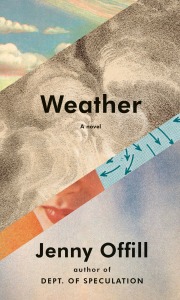 Weather by Jenny Offill
Weather by Jenny Offill
Knopf, February 2020. 207 pg.
fantastic, creative and timely novel addressing the current climate crisis and the impending apocalypse. it’s from the point-of-view of a middle-aged woman –so definitely relatable to me (I want to read more novels about older women). She’s married and has a son. Her brother is a recovering drug addict and she’s had to care for him throughout the years. Jenny Offill excels at this observational narrative. It’s short, riveting, potent. It’s really the perfect thing to read during this COVID-19 pandemic and quarantine we’re all experiencing. Plus it’s quite relatable to middle-aged spinster GenX me: “The woman has just turned fifty. She tells me about her blurriness, the way she is hardly seen. She supposes she is not so pretty anymore–fattish, hair a bit gray. What she has noticed, what gives her a little chill, she tells me, is how if she meets a man out of the context of work, he finds her to not be worth much. He looks over her shoulder as he talks or pawns her off on a woman her own age.”
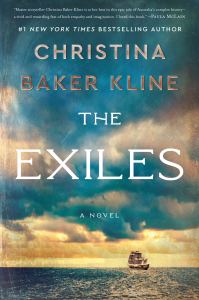 The Exiles by Christina Baker Kline
The Exiles by Christina Baker Kline
Custom House, August 2020. 370 pg.
I loved this amazing work of historical fiction so much and don’t know why I waited so long to write about it! It covers an intriguing aspect of history that I’ve not read much about. Based on actual events, the novel focuses on a ship of female convicts traveling from England to Van Diemen’s Land (Tasmania) in the 1850s. Although Aboriginal people have occupied Australia for thousands of years, the British government views the native people as nuisances and the land to be uninhabited and available for their use. It’s amazing to think about some of the low level crimes for which many were sentenced as well as the harrowing passage. “Evangeline recalled seeing small items in the newspaper over the years about the incorrigibles– men, she thought– transported on convict ships to Australia. Murderers and other deviants exiled to the far side of the earth, ridding the British Isles of the worst of its criminals.” Evangeline is a governess accused of stealing a ring which had been given to her by the family’s older son with whom she’d become romantically involved. She’s well-educated and her late father was a minister. The other staff members didn’t like her. “She was, by temperament, much like her father: diffident, with a shyness often mistaken for aloofness, a bookishness perceived as snobbery.” She’s sentenced to 14 years in prison. She’s pregnant and gives birth to a daughter onboard. Sadly she’s thrown overboard by a crew member who she’d stabbed to protect Hazel, who he’d been sexually assaulting. Hazel is a scrappy convict whose midwife mother taught her many potions and remedies. Mathinna is a native woman who knows how to read and learns to speak French. She’s taken from her tribe by Van Diemen’s governor’s wife on a whim. She considers her a project. It doesn’t work out well. The novel’s a complete page turner and I became so invested in these women I didn’t want it to end.
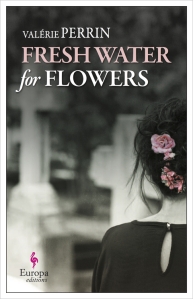 Fresh Water for Flowers by Valerie Perrin
Fresh Water for Flowers by Valerie Perrin
Europa, June 2020. 476 pg.
“My closest neighbors don’t quake in their boots. They have no worries, don’t fall in love, don’t bite their nails, don’t believe in chance, make no promises, or noise, don’t have social security, don’t cry, don’t search for their keys, their glasses, the remote control, their children, happiness.”
I walk in cemeteries fairly often. There’s one in my neighborhood. When I was in grad school, I would drive to the Arlington National Cemetery to take walks through it. I liked the quiet and solitude. I sometimes wonder about the people whose names I see on gravestones. Violette Toussaint is a cemetery caretaker in the small French town Bourgogne. She lives on site. She takes notes on everyone who’s buried there. She’s close friends with three gravediggers, three groundskeepers and a priest. She feeds the stray cats that roam the cemetery. She reads. She bakes. It sounded fairly idyllic to me. I love the writing and this character. Violette is different, interesting, smart, thoughtful. I found myself deeply connected to her– “I don’t fit into boxes. I’ve never fit into boxes. When I do a test in a women’s magazine– “Get to know yourself,” or “Know yourself better”–there’s no clear result for me. I’m always a bit of everything.” I don’t fit in boxes either.
“I’m not after a love story. I’m too old for that. I’ve missed the boat. My meager love life is an old pair of socks shoved to the back of the closet.”
Julian Sole, a police detective, arrives one day and tells Violette that his mother wanted her ashes spread on someone’s grave who wasn’t her husband. He wants to know why. Violette reflects on her own husband who had numerous affairs and left her. She recalls: “He turned our bed into a paradise, was considerate and sensual when making love, but as soon as he got up, was vertical, left our horizontal love behind, he lost a good deal of color. He had nothing to say, and was interested only in his motorbike and video games.” Violette’s mother abandoned her and she was pregnant at 18. Drawn to each other, Violette and Julian spend more time together as they help reconcile the past. There are more secrets of the dead and the past revealed but I can’t give too much away or I’d ruin it. The novel unwinds with several twists. It’s smart, funny and dark. Just what I like. It’s a full reflection on life and death and everything involved.
Julian Sole, a police detective, arrives one day and tells Violette that his mother wanted her ashes spread on someone’s grave who wasn’t her husband. He wants to know why. Violette reflects on her own husband who had numerous affairs and left her. She recalls: “He turned our bed into a paradise, was considerate and sensual when making love, but as soon as he got up, was vertical, left our horizontal love behind, he lost a good deal of color. He had nothing to say, and was interested only in his motorbike and video games.” Violette’s mother abandoned her and she was pregnant at 18. There are more secrets of the dead and the past revealed but I can’t give too much away or I’d ruin it. The novel unwinds with several twists. It’s smart, funny and dark. Just what I like. It’s a full reflection on life and death and everything involved.
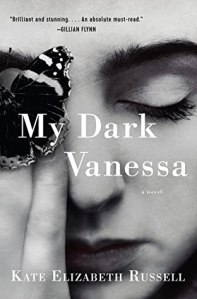 My Dark Vanessa by Kate Elizabeth Russell
My Dark Vanessa by Kate Elizabeth Russell
William Morrow, March 2020. 373 pg.
A 42-year-old English teacher at a prep school in Maine grooms then rapes his 15-year-old student. Although it’s a story that ‘s been told numerous times, it’s a remarkably strong perspective that’s completely engrossing. The story alternates between 2000 and 2017 where adult Vanessa finds herself finally recognizing the level of abuse and how it’s affected her. I have a memory from high school of being in gym class and one of my classmates going up to a (very attractive) teacher and unbuttoning a button on his shirt and commenting something about the full buttoned up style. It was so bold. That was how this popular student commanded attention. I didn’t even kiss a boy until college. Vanessa is incredibly naïve as a student: “It wasn’t about how young I was, not for him. Above everything else, he loved my mind. He said I had genius-level emotional intelligence and that I wrote like a prodigy, that he could talk to me, confide in me. Lurking deep within me, he said, was a dark romanticism, the same kind he saw within himself. No one had ever understood that dark part of him until I came along.” Vanessa writes poetry. Mr.. Strane gives her Sylvia Plath, Emily Dickinson, Edna St. Vincent Millay to read and then he gives her Lolita. As an adult, Vanessa recognizes: “I still feel different from others, dark and deeply bad, same as I did at fifteen, but I’ve tried to gain a better understanding of the reasons. I”ve become an expert on the age-gap trope, consuming books, films, anything featuring a romance between an adult and legal child. I search endlessly for myself but never find anything truly accurate.” She’s also finding it difficult to have relationships with me. She notes: “There are men who never turn into boyfriends, who peer behind the curtain and see the mess of me–literal and figurative: the apartment with a narrow path through the clothes and trash leading from bed to bathroom; the drinking, endless drinking; the blackout sex and nightmares.”
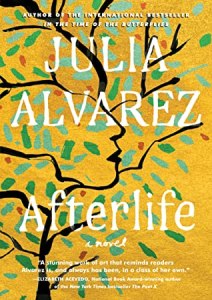 Afterlife by Julia Alvarez
Afterlife by Julia Alvarez
Algonquin, April 2020. 256 pg.
Antonia is a recently widowed, retired English teacher who lives in Vermont. One night she arrives home to find an undocumented pregnant teenager on her doorstep. Then, her sister, who suffers with Bipolar disorder, goes missing. “You’re the most American of us, her sisters have commented to Antonia in an accusatory tone. Just saying, they said smugly when she asked what was wrong with being whoever she was. Admittedly, she was the worrier, the insomniac, the most anxious and disciplined of the sisters.” Through gorgeous prose and astute observations, Julia Avarez examines a woman’s struggles to maintain her individual identity as well as to navigate relationships with her three sisters and her immigrant community.
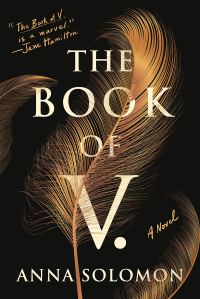 The Book of V by Anna Solomon
The Book of V by Anna Solomon
Henry Holt & Company, May 2020, 320 pg.
I gasped excitedly when I walked into the break room at my bookstore job and saw the ARC of this novel. I tore through this book in two days. Leaving Lucy Pear is one of my favorite novels and now after reading this I’ll count Anna Solomon as a favorite author. This novel focuses on three Jewish women– Lily is a mother, second wife and writer in 2016. Vivian is a political wife during the Watergate-era. Esther is an independent woman in ancient Persia. They’re all strong, independent-minded women. and Solomon fully explores each character’s motivations, desires, needs, struggles, commonalities and connections across the centuries.
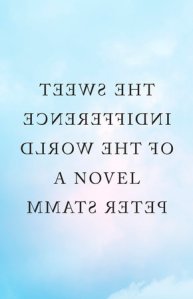 The Sweet Indifference of the World by Peter Stamm
The Sweet Indifference of the World by Peter Stamm
Other Press, January 2020. 160 pg.
I only read one book by a white male author and this is it. I have a handful of favorite cis white male authors and Peter Stamm counts as one of them. I read them immediately. I appreciate his gorgeous, melancholy writing. This one is short and interesting– a writer, Christoph, meets a woman, Lena, who is the doppelganger of his former lover, Magdalena, who inspired his first novel post breakup. Lena recognizes her own relationship with a writer named Chris in the story she’s told. This one blurs past and present, fiction and reality. How much does reality influence fiction and fiction influence reality? He comments: “With youthful pathos, I had believed I had to decide between her and my writing, between freedom and love. Only now did I understand that love and freedom were not mutually exclusive, but mutually entailed: the one wasn’t possible without the other.”
book review: With or Without You
Posted by Amy Steele in Books on August 19, 2020
With or Without You by Caroline Leavitt. Algonquin| August 4, 2020| 288 pages | $26.95| ISBN: 9781616207793
RATING: ****/5*
The way you expect your life to be isn’t often the way it ends up being. Societal pressures and outside influences affect decision-making. People change over time and sometimes love relationships don’t work anymore or just don’t fit. Why do some people languish in relationships that aren’t particularly satisfying anymore? When do you just let go of a relationship, even if you’ve been in it for a substantial amount of time?
Stella and Simon, both 42, live in New York, have been together for 20 years and don’t have any children. An RN, Stella wants a stability and a family. Simon, a musician, still dreams of success and fame in the music industry. Stella and Simon have different personalities and demeanors. Stella is strong, independent, organized, goal-oriented. Simon is laid back and not super responsible. He lives the musician lifestyle— he’s laid back and frequently takes drugs.
“She had given up things for him before. After their first year together, she’d left her job as an RN because it was so exciting to travel with him. And then being on the road got old, or maybe just she did. But by the end of her second year touring with him, she began to feel the need to be a nurse again. It was like a physical pull. She missed having a community of doctors, nurses, and staff that she saw every day.”
It had almost been out of character for Stella to fall in love with Simon— “He came over to see her the next night, and the next, and suddenly there she was, responsible Stella with both feet firmly planted, Stella who never missed a shift, who read books and adored classical music, falling heedlessly for a rocker with an impulsive lifestyle and a way with words, simply because he cared so much about her, Iike no one ever had before.”
As someone who has tried to make relationships work with people who don’t have the same values as me or who don’t have a compatible personality or aren’t going to learn and grow over the years, I found myself deeply connected with this novel. As a music journalist I’ve had many encounters with musicians. I understand the charisma and the draw involved. Someone you might not look at on the street becomes 10x more attractive on stage playing an instrument and/or singing. As a middle-aged woman, I completely comprehend wondering how time flew by and why aren’t I more fulfilled in my life?
On the eve of the start a tour that he hopes will catapult his stagnant music career, Simon convinces Stella to take drugs with him and she falls into a coma for two months. Simon can’t make it out on tour and his band mates find a replacement. He doesn’t know what to do with himself now that he’s no longer in a band. The coma completely transforms Stella. She’s now an artist with a remarkable ability to draw portraits in which she’s able to capture a person’s innermost desires and feelings. While Stella was in the coma, Simon got close to Stella’s best friend. Do Stella and Simon choose loyalty or independence?
At turns melancholy, amusing, relatable and infuriating, With or Without You is a thoughtful novel about choices, identity, self-worth in relationships and careers and remaining true to yourself. It’s about questioning everything that makes you happy and what you should do vs. what truly fulfills you. It’s a complex and unique read.
book review: The Wonder of Lost Causes
Posted by Amy Steele in Books on May 28, 2019
<em>The Wonder of Lost Causes</em> by Nick Trout. William Morrow| April 2019| 440 pages | $16.99| ISBN: 978-0-06-274794-5
<strong>RATING: 3.5/5*</strong>
Dr. Kate Blunt is a single working mother. She’s a veterinarian at an animal shelter. Her son Jasper, who has cystic fibrosis, forms an instantly strong bond with a problematic dog that’s recently arrived. Whistler seems to communicate with Jasper and he also has a strikingly similar cough. It seems obvious that the boy and this dog belong together. If nobody adopts the dog in two weeks, the dog will be euthanized. He’s been badly mistreated and doesn’t trust anyone but Jasper, who desperately wants to adopt Whistler. Kate doesn’t want to adopt any dog. She’s overwhelmed with work and taking care of her chronically ill son. Jasper plans to convince his mother to adopt Whistler. While this is happening, someone contacts the shelter to claim the dog. Apparently, he’s a trained service dog. He’s trained to detect seizures in children. It seems that even if they wanted to adopt him, he belongs to someone else. A child needs him and his special skills. Kate and Jasper travel to deliver the dog to the organization. Will they or won’t they be able to let go of the dog? It’s clear that Jasper’s happier with Whistler.
“I admit it: I’m afraid of change. Living with this disease has rendered me fluent in fear. Change apartments—how hard can it be? Take your dog to work—what’s the problem? You’re a vet; you’ve even got the health insurance issue covered. But let’s say I find a new home that’s perfect for Jasper and money pours into the shelter so I don’t need to look for a new job, I’ve still got to worry. And it’s more than who’s going to clean up an accident because our doctor’s appointment ran late of where on earth the dog will stay when we’re trapped in the hospital for three weeks at a time. It’s the guarantee that a dog will influence my focus on Jasper, distracting me in small, innocent ways, forcing decisions, unnecessary considerations, and, worst of all, extra responsibility. This sounds trivial because it is trivial, but for a single mom with a sick child, the prospect of caring for something, anything more, feels like a burden, a final straw, guaranteed to make our already precarious existence bow, falter, and crack.”
Cystic fibrosis is a genetic disease which causes persistent lung infections and limits the ability to breathe. Alternating between Jasper and Kate’s viewpoints, there’s plenty of insight on what it’s like to struggle with cystic fibrosis and what it’s like to be the caretaker for someone with the disease. Jasper spends lots of time in the hospital. He’s weaker than other children. Jasper comes across as a laid back, savvy, determined child. He’s rather matter-of-fact about cystic fibrosis. His mother understandably worries about her son, maintains a rigid care schedule and remains vigilant about his health and safety. The novel emphasizes how important animals can be to our emotional well-being. I appreciated that author Nick Trout is also a veterinary surgeon in Boston. He brings vast experience to his writing. This novel seems particularly personal as Dr. Trout has a daughter with cystic fibrosis. He’s British and so is Jasper’s absent father, amusingly making Jasper an anglophile to his mother’s dismay. Even if you’re not a dog person, you’ll find yourself rooting for Jasper and Whistler in the end.
MAY IS CYSTIC FIBROSIS AWARENESS MONTH.
–review by Amy Steele
FTC Disclosure: I received this book for review from William Morrow.
book review: Good Riddance
Posted by Amy Steele in Books on February 4, 2019
 Good Riddance by Elinor Lipman. Houghton Mifflin Harcourt| February 5, 2019| 304 pages | $25.00| ISBN: 978-0-544-80825-6
Good Riddance by Elinor Lipman. Houghton Mifflin Harcourt| February 5, 2019| 304 pages | $25.00| ISBN: 978-0-544-80825-6
RATING: 4.5/5*
–review by Amy Steele
“I used to have a husband, from a marriage that was a bad idea from the start. Now I can advise others: Never marry a man who proposes too early.”
When Daphne discards her deceased mother’s yearbook, a neighbor decides she’s going to make a documentary about what she discovers in it. One person’s trash is another’s treasure, particularly an enterprising someone looking to advance her career. Daphne’s mother, June, was a teacher and yearbook advisor for the Class of 1968 who attended every class reunion and kept detailed notes about the students in the yearbook. Seemingly everyone had a crush on Daphne’s mother at this New Hampshire high school. June had an affair with a student after he graduated. Daphne attends a reunion as a fact-finding mission and this man, now a state representative, claims to be Daphne’s biological father. Daphne introduces herself to her tablemates in this manner: “I was bamboozled into a loveless marriage because my husband wouldn’t inherit his grandparents’ money while he was still single.” Daphne hasn’t had the best of luck in relationships. She’s self-deprecating and aware of her challenges and somewhat resigned. She’s completely surprised when she embarks on a tryst with her cute younger neighbor, an actor. She ends up having lots of fun and confides in him. It’s just the ego boost she needs. I found Daphne to be quite genuine and relatable. Her father seems like a great dad. The news that someone else might be her biological father, leads Daphne to have bouts of doubt: “My not sleeping great had to do with the ugly breaking news that my entire existence was based on a lie. Shouldn’t I have been warned of inheritable diseases that might be down the road? Or told to work harder in high school because I could apply as a legacy to Dartmouth? Such were the 2 a.m. agitations of a dispossessed daughter.” Will these new discoveries affect Daphne’s relationship with the only father she’s ever known? Between studying online to become a pastry chef, hooking up with her neighbor and helping her father navigate his recent move to New York, Daphne attempts to thwart her plans to expose her mother’s personal life. Author Elinor Lipman (The Inn at Lake Divine, On Turpentine Lane) successfully contrasts the idiosyncrasies of small town New England with sprawling Manhattan. Lipman is a master of clever, amusing novels with quirky central characters. Her novels are guaranteed delightful fun reading. I love her writing and creativity so much that I received an advanced copy in October and devoured it right away. It’s the ideal anti-Valentine’s read.
FTC Disclosure: I received this book for review from Houghton Mifflin Harcourt.
book review: Crudo
Posted by Amy Steele in Books on September 10, 2018

Crudo by Olivia Laing. W.W. Norton| September 11, 2018| 142 pages | $21.00| ISBN: 978-0-393-65272-7
RATING: 4.5/5*
The ecru cover with black lettering and a dismembered fly in the middle of Crudo’s cover pulled me in with its darkness. This might be a slim novel but it’s packed with provocative prose, eccentricities, witty observations and overall intellectual prowess not often accomplished through such brevity and through experimental style. It’s not easy to explain when nothing and everything occurs. It’s a feverish and daring stream of consciousness about our destructive and often restrictive society. Finding an element of safety and belonging can be overwhelming. Author Olivia Laing (The Lonely City) impressively wrote her fictional debut in real time over the course of seven weeks.
Kathy, a recently-turned-40 writer contemplates existential issues, the horror of the Trump presidency, white supremacy, Brexit, impending nuclear war with North Korea, social media, marriage and love. “She was at the middle of her life, going south, going nowhere, stuck between station like a broken-down engine.” She marries a man 29 years older than her (also a writer) and falls in love. Of this new marriage: “She was feeling panicky, she couldn’t quite remember how to be alone, ironic since she barely regarded herself as female. A fag with tits, statically improbable but not unheard of, especially in the conglomerate-building internet era of gender dismantlement.”
When Kathy meets a friend at a pub, “They talked about marriage, how to do it so it didn’t bury you beneath its baggage. They thought they had a handle on it, they thought they could see a way to maintaining their dignity independence autonomy style, but it was touch and go they both admitted.” Completely relatable to me as I’m 49 and I haven’t been on a date in a year and I’ve never been married and struggle to find someone intellectually and culturally compatible. Someone who can support and comfort without control or stifling. “You think you know yourself inside out when you live alone, but you don’t, you believe you are a calm untroubled or at worst melancholic person, you do not realize how irritable you are, how any little thing, the wrong kind of touch or tone, a lack of speed in answering a question, a particular cast of expression will send you into apoplexy because you are so unchill, because you have not learnt how to soften your borders, how to make room.” Sheer brilliance throughout.
–review by Amy Steele
FTC Disclosure: I received this book for review from W.W Norton.
book review: My Year of Rest and Relaxation
Posted by Amy Steele in Books on August 6, 2018
 My Year of Rest and Relaxation by Ottessa Moshfegh. Penguin Press| July 2018| 289 pages | $26.00| ISBN: 978-0-525-52211-9
My Year of Rest and Relaxation by Ottessa Moshfegh. Penguin Press| July 2018| 289 pages | $26.00| ISBN: 978-0-525-52211-9
RATING: *****/5*
–review by Amy Steele
“Oh, sleep, nothing else would ever bring me such pleasure, such freedom, the power to feel and move and think and imagine, safe from the miseries of my waking consciousness.”
Before I discovered yoga and meditation I would often isolate from the world by downing a bunch of pills. After a bad break-up, I spent three weeks consuming solely Diet Coke and Klonipin. Not advisable but I wanted to shut everything out as quickly as possible and for as long as possible. It was inherently easier to sleep through the misery in hopes I’d eventually feel better. It wasn’t the best coping mechanism. In case anyone’s wondering, I no longer drink soda and rarely rely on Klonipin. I still have terrible agoraphobia and anxiety but numbing myself isn’t going to fix that and there are much more productive uses of my time.
Everything appealed to me about the novel My Year of Rest and Relaxation, from the title to the cover—a portrait of a sullen Victorian woman—to the description to this sentence in the opening paragraph: “I’d get two large coffees with cream and six sugars each, chug the first one in the elevator on the way back up to my apartment, then sip the second one slowly while I watched movies and ate animal crackers and took trazodone and Ambien and Nembutal until I feel asleep again.”
The novel focuses on a 24-year-old Columbia University graduate in the year 2000 in New York City and her intention to essentially hibernate through the year with pharmaceutical assistance. She’s recently lost her art gallery job. Her parents died while she was in school. Her on-again-off-again relationship with a guy who works on Wall Street doesn’t satisfy. So what’s so bad that she needs to shut out the world. She explains: “I can’t point to any one event that resulted in my decision to go into hibernation. Initially I just wanted some downers to drown out my thoughts and judgments, since the constant barrage made it hard not to hate everyone and everything, I thought life would be more tolerable if my brain were slower to condemn the world around me.”
She lives in an inherited apartment with few financial concerns. Her friend Reva, who she met in college, stops in once a week for a wellness check. Of Reva: “I don’t know what it was about Reva. I couldn’t get rid of her. She worshipped me, but she also hated me. She saw my struggle with misery as a cruel parody of her own misfortunes. I had chosen my solitude and purposelessness, and Reva had, despite her hard work, simply failed to get what she wanted—no husband, no children, no fabulous career.” She spends any waking hours watching movies, particularly those starring Whoopi Goldberg and Harrison Ford. She also finds questionable psychiatrist who unwittingly assists her sleep plans by prescribing an arsenal of drugs.
“I went to the bathroom and took stock of the medicine cabinet, counting all my pills on the grimy tile floor. In all, I had two Ambien but thirty more on the way, twelve Rozerem, sixteen trazodone, around ten each of Ativan, Xanax, and Valium, Nembutal, and Solfoton, plus single digit amounts of a dozen random medications that Dr. Tuttle had prescribed only once…”
One might wonder how an entire novel could revolve around this subject. Author Ottessa Moshfegh delves into the narrator’s past—her previous relationships, her family, her relationship with Reva, as well as her aspirations as an artist. About her parents: “And I’d feel sorry for myself, not because I missed my parents, but because there was nothing they could have given me if they’d lived. They weren’t my friends. They didn’t comfort me or give me good advice. They weren’t people I wanted to talk to. They barely even knew me.”
Dark humor, a self-deprecating tone and astute details and brilliant writing makes this novel work so well. There are strong Sylvia Plath vibes throughout. If you’ve dealt with mental illness, a major loss or being an outcast then you’ll likely appreciate this character. I found her to be immensely relatable. It’s a complicated, challenging world and some of us find solace in darkness.
FTC Disclosure: I received this book for review from Penguin Press.
STEELE INTERVIEWS: Joanna Luloff
Posted by Amy Steele in Books, Interview on July 16, 2018

While on assignment in India, Clare, an international journalist, becomes stricken by an illness which destroys her memory. Once back in the states she’s forced to rely on her husband Charlie and her best friend Rachel to reconstruct the past and her memories. Does she remember specifics of her marriage and her friendship, the things that sustain these relationships? Claire senses that something isn’t right but doesn’t know if it’s her marriage or her friendship or a combination. Can she even trust Charlie and Rachel. The novel is effectively told in different points of view and jumps back and forth from present to past and back again.
I spoke with author Joanna Luloff by phone earlier this month.

Amy Steele: Where did you get the idea for this novel?
Joanna Luloff: My mom and I talked about her memory loss and how she had to borrow other people’s memories. A lot of years later when I was actually in graduate school, we started to have this correspondence where I would send her a photograph and I’d ask her what she saw in it and she’d do the same for me. I also did an experimental project for a class that I was taking.
I became more interested in the people surrounding someone with memory loss and how it affects them. To lose the confirmation from other people. The story got shifted away from just a person with memory loss to those people surrounding that person and it started to shift away from my family into fictional characters and what it meant to gradually recover their love for each other and the secrets and all this conflict.
Amy Steele: A lot of times you want to let things go from the past and live in the present but obviously there are certain connections which affect how you’re fitting in with certain people.
Joanna Luloff: The idea that memory is very subjective anyway. We frame the story as we remember it. My brother and I have very different recollections of the same event. As a fiction writer, I love to elaborate and add to the story. I know my stories are often changed through imagination.
Sometimes I think you can rewrite and event or create the situation you’d want to have or rework a situation/ investigate it.
Amy Steele: Did you prefer writing a certain character?
Joanna Luloff: I probably had the easiest time writing Rachel’s character because she gets to be an observer and be on neutral ground but she also has her own secrets. She sees so much so it was fun. And Charlie might have been the hardest because he’s a man from England. I lived in England for a really short time and I was really struck by the reserved politeness and stoicism. I tried to channel a bit of that restraint which British men seem to have.
Amy Steele: Do you think writing his character was the greatest challenge in the overall writing of the novel?
Joanna Luloff: I think the biggest challenge I had was not about character or voice but the structure. I needed to figure out the story’s chronology. For Claire, obviously her memories were super jumbled and the characters are constantly moving from the present to the past. My first drafts of the novel were disjointed.
Amy Steele: I was skeptical of everyone involved. How do you organize? How long did it take you to write the novel?
Joanna Luloff: It didn’t take me a long time to write the first draft. I was at least able to knock out the basic foundation of the book. It was a lot of revisions and layering in the mystery or base suspicion of what the truth might be.
I wrote it out longhand and it worked out well because I was able to rip out pages and lay them out on the floor and play around with what needed to go where and I think it helped to be able to see it in different forms. Once that was in place then I did some adding and subtracting where I thought there needed to be more questioning of the character. I was able to play a bit more with how much the characters were withholding from each other, why they were doing that, all the secrecies and the past injuries to layer in eventually.
Joanna Luloff received her MFA from Emerson College and her PhD from University of Missouri. She teaches at the University of Colorado.
She’ll be appearing at Harvard Book Store on Monday, July 16, 2018.
book review: Before Everything
Posted by Amy Steele in Books on August 3, 2017
 Before Everything by Victoria Redel. Viking| June 2017| 288 pages | $26.00| ISBN: 9780735222571
Before Everything by Victoria Redel. Viking| June 2017| 288 pages | $26.00| ISBN: 9780735222571
RATING: ***/5*
In hospice for cancer, Anna’s old childhood friends gather at her house. Before Everything moves from present to past to provide the reader with details about each woman’s connection to Anna. Comfort, support and nostalgia connect this group of friends. Each woman has a specific relationship with Anna and with each other and then as a group. There’s the group think and then the individual’s thoughts. Whenever the novel veered into the precious and perfect I lost interest. Lovely crisp writing kept me reading. Author Victoria Redel powerfully chronicles Anna’s battle with cancer and hospice care and dying. This aspect of the novel interested me most. On fear of dying: “That was what Helen had never asked, what over all these years of treatment and periods of health Helen and The Old Friends have trained themselves not to ask. It was a tacit agreement. The answer was too obvious; it loomed in each moment’s specific worry.”
Despite caring so much there’s still a level of competition between the friends: “But Helen knows the answer. She’s known it since she arrived two weeks ago and began her adamant petition to pull Anna from hospice. She knew it back at the pond when she agreed to help Anna if Anna asked. Helen’s job all these years was to keep Anna away from fear and close to the yes. But Anna is not afraid. Again, Anna is doing something before Helen. It has always been this way. Boys. Drugs. Marriage. Children. Even the pregnancy that Anna ended. Over and over. Anna went first. Now this.”
I appreciated the realistic description of outsider views of these old friends: “He was glad for her yelp. Any dose of dark humor was better than all the treacly concern he heard from her visitors.” A newer friend thought: “The Old Friends. Whatever they called themselves, there was always a pecking order. Pretty pathetic considering the circumstance.” When my friend’s mom fought cancer, some of her friends kind of pushed my mom away when my mom wanted to help. I can’t imagine still being so connected to childhood friends. At every phase of my life I’ve lost friends and made new friends. I maintained friendships with high school friends into college and some college friends post-college and sure I am still connected to some high school and college friends via Facebook but if I really needed someone would these friends be there for me? The novel started strong and petered out toward the end. It seemed too much, these women and their near perfect lives and near perfect friendships. At the last high school reunion I attended a friend said that it was impossible to know what other classmates had endured despite outward appearances to the contrary. I get it. Unfortunately, I lost a connection to the various characters.
FTC Disclosure: I received this book for review from Viking.
book review: On Turpentine Lane
Posted by Amy Steele in Books on February 28, 2017

On Turpentine Lane by Elinor Lipman. Houghton Mifflin Harcourt| February 2017| 305 pages | $24.00| ISBN: 978-0-544-80824-9
RATING: ****/5*
Faith Frankel, a thirty-two-year-old single woman, moved back to her hometown and works in stewardship at her alma mater, a private school. She recently purchased a house with a questionable history. Faith’s fiancé quit his job to trek across the country living off of Faith’s credit cards. He’s not walking for a cause but to find himself and Faith’s rather bothered by the photos with various women he keeps posting to social media. Faith’s father has become a painter, specifically making Chagall knock-offs and personalizing them. He becomes involved with a younger woman setting off some issues with her parents and the rest of the family (mainly Faith and her brother). While juggling her fiancés antics with her father’s new career and her mom’s meddling, her brother hustles with his snowplow business in the small western Massachusetts town.
Why someone so smart and independent would remain engaged to this unaware guy? What’s appealing about Faith is that she’s not obsessed with getting married even though she did get engaged to her boyfriend before he embarked on his cross-country walk. She enjoys her work but isn’t obsessed with it. While her friends can’t understand why Faith moved back home from Manhattan, she’s thrilled to make a cozy home on Turpentine Lane. She’s content with her straightforward comfortable career and her new house.
Author Elinor Lipman describes Faith’s position as writing thank-you notes (by hand!) to donors. I have worked in stewardship and never wrote notes by hand. But I let it go as it’s a small town and a private school and a novel. In the Q & A that arrived with the press materials for the novel there’s this question: “Faith works at a private school as Director of Stewardship. Is that a real job?” Do people, particularly in publishing and writing, not know about it? At another point in the novel there’s mention of a landline. I don’t know anyone under 50 who still uses a landline.
The local police keep searching Faith’s basement for murder evidence based on an anonymous tip. After finding a creepy photo album in her attic, Faith invites her handsome coworker, who recently split with his live-in girlfriend, to become her housemate. It’s not long before the longtime friends become romantically involved. Her brother and her mother end up helping Faith investigate the strange photo album and its connection to the past owner. This all sounds rather madcap and it could go terribly awry. In Lipman’s hands it’s a clever and delightful read.
A native of Massachusetts, Lipman graduated from Simmons College. I am also an alumna. I’ve read every one of Lipman’s novels. My favorite is The Inn at Lake Devine. I also really like Isabel’s Bed and Then She Found Me (which was adapted into a film starring Helen Hunt). Her novels tend to be witty, engaging and feature multifaceted, appealing and flawed female characters. Is there any more intriguing kind of woman? If you’re looking for a sharp and entertaining read, On Turpentine Lane will definitely satisfy.
–review by Amy Steele
FTC Disclosure: I received this book for review from Houghton Mifflin Harcourt.
Elinor Lipman will read at Porter Square Books, Cambridge, Mass. on Thursday, March 2, 2017.
STEELE PICKS: Best Books of 2016
Posted by Amy Steele in Books on January 8, 2017
quite delayed on posting my year-end list.
here are the best books of 2016 [not ranked]:

An Abbreviated Life: a memoir by Ariel Leve [Harper]
–gorgeous writing, sad story. resilience. My parents got divorced when I was around the same age and I only have a few isolated or vague memories.

Alligator Candy: a memoir by David Kushner [Simon & Schuster]
—David Kushner’s older brother Jon disappeared one day on a bike ride to get candy and two men savagely murdered him, sodomized him postmortem and mutilated his body. It’s a horrific event to happen in one’s family. Only four at the time, Kushner didn’t quite understand the full impact. He missed his brother but didn’t know the complete details. Now a journalist, he decided to revisit the case and provide a voice for and memory of his brother. Through compelling prose and devastating emotion this memoir potently addresses murder and its effect on the family. full review.

Future Sex by Emily Witt [Farrar, Straus and Giroux]
—Future Sex reads as a fascinating sociological study on sexuality that delves into orgasmic mediation, internet porn, webcams, Burning Man and polyamory. Witt combines personal experience with research and reporting in a darkly amusing, honest and real manner. Witt investigates sites I’d barely heard of: Chaturbate; Porn Hub; Kink.com; Fetlife. She attends an orgasmic mediation workshop [looked up on YouTube and there are tutorials] and travels to Burning Man. She interviews tons of people such as polyamorous Google employees, the founder of OKCupid, a 19-year-old webcammer as well as a woman who creates female-centered porn. Witt doesn’t make a spectacle of what may be absurd. Instead she writes analytically, astutely with brevity and a sharp edge. full review.

Girl Through Glass by Sari Wilson [Harper]
—A former ballet dancer, Wilson provides intimate details about New York’s ballet scene. While this isn’t solely a novel about the ballet world, girls straddling the line between youth and adulthood provides fascinating reading. The novel flawlessly describes the razor sharp focus on becoming the best, earning a particular status and securing one’s place in this strange world overflowing with beauty and sacrifice. And what happens to all those girls who aren’t’ quite the best? Those girls who do not make the right school or earn a place in a prestigious ballet company? This absorbing, riveting novel does what a wonderful novel can do: it completely transports readers to a specific time and place in such an effective and specific manner that one thinks about the subject and characters well past finishing the last page. full review.

Heat & Light by Jennifer Haigh [Ecco]
—Returning to Bakerton, Pennsylvania—the setting for the 2005 best-selling novel Baker Towers—author Jennifer Haigh again focuses on an energy source and its effects on a small community. full review.

Here I Am by Jonathan Safran Foer [Farrar, Straus and Giroux]
–phenomenal writing. for some reason I waited to read this (maybe because it’s quite long and dense). immediately engulfed in the story of a family coming apart. numerous other elements including being Jewish and Middle East politics. amazing.

Lazaretto by Diane McKinney-Whetstone
—Set in post-Civil War Philadelphia, this historical fiction novel beautifully explores race, class, gender and family. full review.

Leaving Lucy Pear by Anna Solomon [Viking]
—An engrossing and gorgeous work of historical fiction, this novel effectively weaves together issues of class, feminism, wealth, power, mental illness and motherhood. The setting: Cape Ann, Massachusetts, a working class fishing community as well as a lovely coastal summer getaway for Boston’s wealthy. In 1917, the unwed teenage daughter of a wealthy family abandons her newborn daughter under a pear tree outside her uncle’s estate on Cape Ann. A decade later, Beatrice finds herself unexpectedly reunited with the Irish woman raising the determined and spunky Lucy Pear. full review.

Modern Girls by Jennifer Brown [NAL]
–The novel focuses on a strong mother-daughter relationship. Brown incorporates historical details which strengthen the plot, setting and characters. For instance in a meeting Rose attends, she urges her comrades to write letters to their Senators to repeal 1924’s Johnson-Reed Act which instituted quotas on the number of Jews that could enter America. While Rose and Dottie don’t share every detail with each other they’ve developed a solid bond and care deeply about each others well-being. Mother and daughter respect and support each other. Despite the decade, the restrictions against women and standard domestic expectations, these women remain strong feminist characters. A sequel set 10 or 15 years on would be greatly welcomed. These characters must be followed up on. Clear your schedule and brew a pot of tea. Once you start this wonderful, detailed novel you’ll want to read straight through. full review.

The Other Woman by Therese Bohman [Other Press]
—This novel bursts with intellectual prowess. It’s witty, provocative and thoughtful about money, class, what it is to have less and desire more, to be educated and smart but not particularly suited to anything. Swedish author Therese Bohman examines societal expectations of what makes a complete life: a good job; a happy coupling; a nice place. All the things by which we define ourselves but realize the innate superficiality of it all. If we focus on the having and not the feeling and the experiencing then we lack integrity, depth and strength of character. full review.

Pull Me Under by Kelly Luce [Farrar, Straus and Giroux]
—Pull Me Under is an exquisitely dark psychological thriller which examines identity and place through its compelling protagonist and story. read my complete review.

Rare Objects by Kathleen Tessaro [Harper]
–lovely historical fiction set in Boston. Author Kathleen Tessaro adeptly describes both the immigrant North End and wealthy mansions with vivid detail. Superb writing and research merge to tell this wonderful story. a page-turner about class, friendship and the things and people we value most. full review.

The Sun in Your Eyes by Deborah Shapiro [William Morrow]
–There’s that saying that you can’t tell a book by its cover. Book covers visually connect a potential reader to the book. The cover image makes you wonder what the book will be about. A beautiful, cool book cover sets expectations. On the cover of The Sun in Your Eyes is a photo of two women with a definite 70s rocker chic. What’s going on between these two women? It’s a 1974 photograph by William Eggleston and drew me right in. I’d also just seen the photo in the documentary Big Star: Nothing Can Hurt Me which features this photo. The blonde was Alex Chilton’s girlfriend. full review.

The Vegetarian by Kang Han [Hogarth]
–I’ve been a vegan for about eight years and am not too thin. Due to psychiatric meds I need to lose weight. I stopped eating red meat at 12!/everything but fish at 18 then went vegetarian to vegan. So the being deprived and malnourished because she’s not eating meat is bothering me a tad. Otherwise, the writing is great. It’s dark and suspenseful. Entirely original and engrossing.

We Love You, Charlie Freeman by Kaitlyn Greenidge [Algonquin]
–a thoughtful and provocative novel which effectively and creatively winds together numerous subjects from coming-of-age, first love, adolescence, sisterhood, race, anthropology, history and family dynamics. In 1990, a family relocates from Dorchester, Massachusetts to the Berkshires to teach sign language to a chimpanzee at the Toneybee Institute for Great Ape Research. full review.


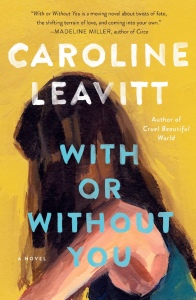









You must be logged in to post a comment.